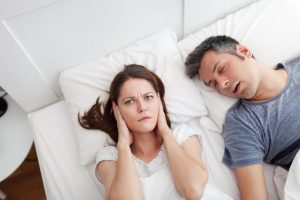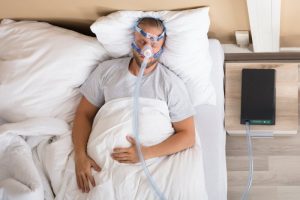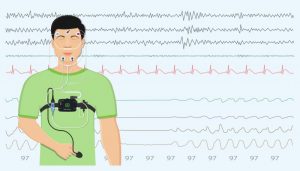Surrounded By Snorers
May 30, 2013

Q: What is it with men and snoring??!! I don’t know many men who can honestly say that they don’t snore. My father-in-law did it; my dad does it. And, now, I am double-whammied, because I have not only one man in my house who snores but two!
(more…)CPAP Related Infections
May 23, 2013

Q: This morning I had a patient who uses a CPAP and also has problems with sinus infections. She asked me if I knew of any problems with the CPAP causing infections. I didn’t know and was wondering if you know.
Dr. Smith: Eye infections are common due to minor mask leaks, and sinus infections can get serious real quick. If there is rhinorrhea, this is a sign of trouble. Obesity and OSA can predispose someone to cerebrospinal fluid leak. OSA can cause an increase in intracranial pressure, and this is exacerbated with nasal CPAP. The cribiform plate is very thin, and this excess pressure can expose defects. Bottom line – make sure they are monitored very closely.
Periodic Limb Movements Without OSA
May 16, 2013
Q: I have a patient who has no sleep apnea and does not desaturate, but who has 60 periodic limb movements an hour. The sleep physician, a pulmonologist, referred him to an ENT for surgery to help the snoring, but said that since he wasn’t sleepy, we could ignore the limb movements for now. He did have about 30 arousals from limb movements each hour. What do you think of his advice?
Dr. Smith: PLMD often accompanies sleep disordered breathing. However, since his AHI and SpO2 are relatively normal, these movements do not appear to be related to his breathing at all. One movement every minute of the night is very excessive, and since he is also aroused out of normal sleep architecture every 2 minutes, I have to think this is affecting his sleep, even though he does not admit to sleepiness.
I have picked up early Parkinsons in a patient like this, so I am a bit sensitive to the issue, and would discuss a referral to rule this out if he was may patient. As the sleep MD is a pulmonologist, and not a neurologist, he would be less likely to make the connection. However, hopefully, I am just an alarmist, and the patient has little to worry about. Maybe you can make him an appliance for his snoring, then get him retested to see if the PLMD has improved.
The Importance of a Sleep Study
May 9, 2013

Every time I teach a seminar to dentists on treating snoring and sleep apnea, I get this question: “Dr. Smith, if I have a patient who comes in and says they want an appliance for their snoring, and that they know they don’t have sleep apnea, can’t I just make them a snore guard to help the snoring?”
It’s a legitimate question, and unless a doctor truly understands the field of sleep disorders, he or she could move down a path they should not have traveled. Allow me to explain.
(more…)“My husband snores, but I never see him stop breathing or gasp for air, so I’m sure he doesn’t have sleep apnea”
May 2, 2013
I’m afraid bed partners are ill-suited to be airway diagnosticians, regardless of their sincerity. There are reasons for this, of course, so allow me to explain.
First, audible gasps and breathing pauses are not the only manifestations of sleep apnea. In fact, there is a condition known as silent apnea, where snoring does not even exist.
Secondly, many bed partners (and I am not saying you do this) will nudge their partner when they are snoring, urging them to move to a side sleeping position where the snoring is not so irritating. This will also lessen the likelihood of apneic episodes, but as soon as the non-snoring partner goes to sleep, the snorer might roll onto their back and succumb to a collapsed airway caused by gravitational forces.
Finally, unless you are awake, watching him sleep all night long, there are many phases of sleep staging, and some are more prone to causing sleep disordered breathing. The most common would be REM sleep, as he is essentially paralyzed during vivid dream action (for obvious reasons). The majority of REM sleep occurs during the latter third of the night, so if you primarily watch or listen during the first hour or so, he is not likely to get into any REM sleep at all!
I hope this helps you understand why it is so important that your husband gets a sleep study, so that we can rule in or out the existence of sleep apnea. You could very well save his life by urging him to seek a diagnosis of his sleeping condition.
